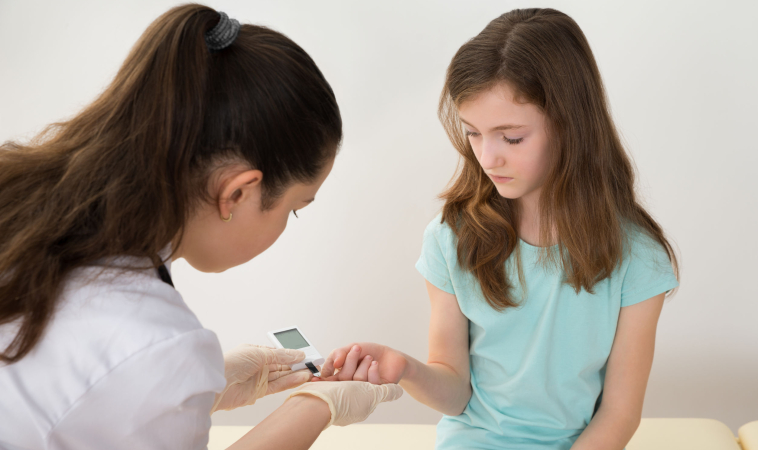Diabetic ketoacidosis (DKA), a serious but common complication of type 1 diabetes, is linked to lower IQ scores and worse memory in children with type 1 diabetes, according to a study led by UC Davis Health researchers. The study published Sept. 22 in Diabetes Care is also the first large-scale work to differentiate between DKA’s impact on children with a new diagnosis and children with a previous diagnosis of type 1 diabetes.
DKA happens when diabetes goes undiagnosed or is poorly managed
DKA happens when diabetes goes undiagnosed or is poorly managed. With DKA, blood sugar gets very high as acidic substances called ketones build up to dangerous levels in the body. Early signs of DKA include excessive thirst, frequent urination, and nausea, abdominal pain, weakness and confusion.
“We assessed the neurocognitive effects of DKA in children with known type 1diabetes as well as in those who were just diagnosed with it,” said Simona Ghetti, professor of psychology at UC Davis and the lead author on the study. “Our study uncovered that even one severe episode of DKA in children newly diagnosed with type 1 diabetes is linked to cognitive problems; and among children with a previous diagnosis, repeated DKA exposure predicted lower cognitive performance after accounting for glycemic control.”
The study included 376 children with type 1 diabetes and no DKA history and 758 children with type 1 diabetes and a history of DKA. These children, ages 6-18 years, were participating in a DKA clinical trial at the Pediatric Emergency Care Applied Research Network (PECARN) sites led by two of the study’s co-authors, Nathan Kuppermann and Nicole Glaser.
One severe DKA episode can hurt memory and IQ
The study found that among children newly diagnosed with type 1 diabetes, those who experienced moderate and severe DKA had lower long-term memory compared to children with diabetes and no exposure to DKA. Greater severity of DKA was also associated with lower IQ in these children.
Children with a previous diagnosis showed lower performance compared with children with new onset in measures of memory and IQ, suggesting that cognitive deficits may worsen over time.
Study allowed the researchers to capture complex associations of DKA severity, socioeconomic status and glycemic control
The study’s large sample allowed the researchers to capture complex associations of DKA severity, socioeconomic status and glycemic control among previously diagnosed patients. These associations revealed that patients with repeated DKA exposure and poorly controlled type 1 diabetes are at substantial risk of cognitive deficits.
“The results from the study emphasize the importance of prevention of DKA in children with known type 1 diabetes and of timely diagnosis during new onset before the development of DKA,” said Glaser, professor of pediatrics at UC Davis Health and senior author of the study. “There is an opportunity to prevent DKA with proper management of the glucose level in the blood.”
1. Ghetti et al. Cognitive Function Following Diabetic Ketoacidosis in Children With New-Onset or Previously Diagnosed Type 1 Diabetes. Diabetes Care, 2020 DOI: 10.2337/dc20-0187

Razi Berry is the founder and publisher of the journal Naturopathic Doctor News & Review, which has been in print since 2005, and the premier consumer-faced website of naturopathic medicine, NaturalPath. She is the host of The Love is Medicine Project docuseries, The Natural Cancer Prevention Summit, The Heart Revolution-Heal, Empower and Follow Your Heart, and the popular 10-week Sugar Free Summer program. From a near death experience as a young girl that healed her failing heart, to later overcoming infertility and chronic fatigue syndrome and fibromyalgia through naturopathic medicine, Razi has lived the mind/body healing paradigm. Her projects uniquely capture the tradition and philosophy of naturopathy: The healing power of nature, the vital life force in every living thing and the undeniable role that science and mind/body medicine have in creating health and overcoming dis-ease. You can follow Razi on social media: Facebook at Razi Berry, Instagram at Razi.Berry and join the Love is Medicine group to explore the convergence of love and health. Look for more, and listen to more Love is Medicine podcast episodes here.

















